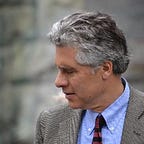Devolving Power: The Challenge of Our Age
George Washington, Selfish Genes, and Giving up Privilege
Two days before Christmas in 1783, George Washington resigned his commission as the leader of the continental army. Heather Cox Richardson, in her brief recent essay, does an excellent job of describing how unusual such an act was. The world had few modern models of transferring state power beyond revolution and conquest. The near mythological story of Cincinnatus leaving Rome and returning to his farm is about it.
This concept of the peaceful transfer of power is so central to our democracy that the artist, John Trumbull, chose it for his major work in the Rotunda of the US Capital. Said Trumbull: “I have thought that one of the highest moral lessons ever given to the world, … in resigning his power and commission as he did, when the army, perhaps, would have been unanimously with him, and few of the people disposed to resist his retaining the power…”
I love this moment. It is reminiscent of the scene in “Hamilton” when King George hilariously states that he could not imagine that giving up power was even a thing: “I wasn’t aware that was something a person could do!”
An important part of American history, to be sure, but for me, it is even more important as a part of human history. Thomas Piketty, the economist, has focused his most recent book on the long term trend toward more “social, economic, and political equality.” This trend is presented as a truism, an observable fact of history, apparently automatic, except for spasms of autocracy and centralized power, prominent in the 20th century and resurgent in our own day.
I believe this is a mis-reading of history. There is nothing automatic in the devolution of power. Giving up power, once consolidated, is a supreme act of humanity that runs counter to some very deeply wired biological instincts. Our dominant social, economic and political systems are driven by our assumptions about competition and self-maximization — the accumulation of power and resources in support of ourselves and our kin — fundamentally the “selfish gene” view of the world. There is no denying the power of this instinct — an attitude of scarcity that drives the “invisible hand” of the marketplace and underlies much of modern economics and social science. Reasonably so, it has delivered unbelievable abundance in the last 500 years.
But it is just a story, not an immutable fact of human nature. In reality, collaboration got us here and collaboration will get us out. Our reliance on each other and on other living systems is likely much deeper than our competitive nature. It is past time to rediscover the mutual dependence and collaboration that lies even deeper in human nature than self-maximization.
We could start with sharing and giving away power, a process we have barely begun.
